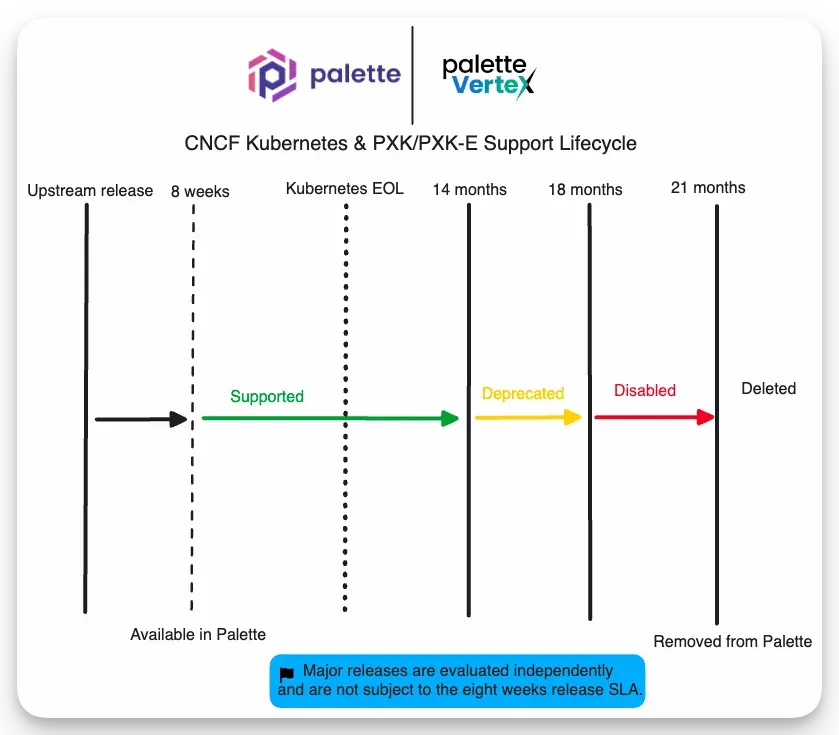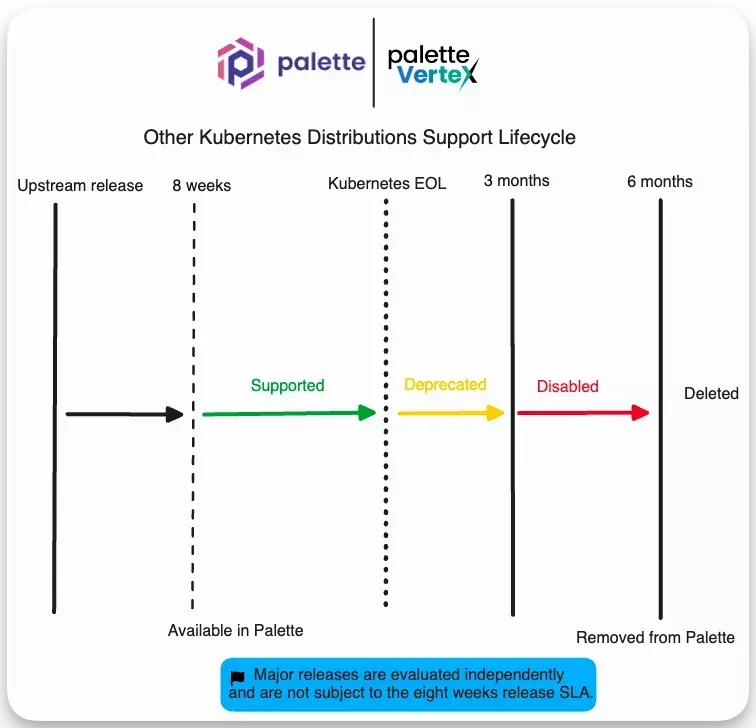Kubernetes Support Lifecycle
Overview
We follow a similar lifecycle as established by the Kubernetes community. You can learn more about the official supported Cloud Native Computing Foundation (CNCF) Kubernetes release cycle in the Kubernetes Releases page. This means we support three minor Kubernetes versions at any given time. We support the current release and the three previous minor version releases, also known as N-3. For example, if the current release is 1.29, we support 1.28, 1.27, and 1.26.
The table below lists the Kubernetes distributions we support and the duration of support.
| Kubernetes Distribution | Supported Minor Versions | Support Duration | Notes |
|---|---|---|---|
| CNCF Kubernetes | N-3 | 14 months | The official open-source version of Kubernetes. |
| Palette eXtended Kubernetes (PXK) | N-3 | 14 months | Additional support may be extended. Discuss this with our support team if you need additional support. |
| Palette eXtended Kubernetes - Edge (PXK-E) | N-3 | 14 months | Additional support may be extended. Discuss this with our support team if you need additional support. |
| Other | N-3 | EOL | Other distributions available in Palette such as K3s, Microk8s, and RKE2, we only support until their official EOL. The EOL is set by the respective owner. |
Kubernetes follows the semantic version schema. Versions are annotated as x.y.z, where x is the major version, y is the minor version, and z is the patch version.
We support N-3 Kubernetes minor versions until the official End-Of-Life (EOL). Once we stop supporting the minor version, we initiate the deprecation process. You can learn more about our deprecation process in the Pack Deprecation section.
Palette eXtended Kubernetes Support
We support CNCF Kubernetes, Palette eXtended Kubernetes (PXK) and Palette eXtended Kubernetes Edge (PXK-E) for N-3 Kubernetes minor versions for a duration of 14 months. The duration exceeds the official EOL by four months. Once we stop supporting the minor version, we initiate the deprecation process.
The diagram below illustrates the support lifecycle of a Kubernetes version. A deprecated Kubernetes version will no longer receive updates.

Additional support may be extended for PXK and PXK-E. Discuss this with our support team if you need extended support. You can contact our support team at support@spectrocloud.com.
Other Kubernetes Distributions
We support other Kubernetes distributions such as K3s, Microk8s, and RKE2 until their official EOL. The EOL is set by the respective owner. Once we stop supporting the minor version, we initiate the deprecation process. You can learn more about our deprecation process in the Pack Deprecation section.

Kubernetes Upgrades
Once you upgrade your cluster to a new Kubernetes version, you will not be able to downgrade. We recommend that, before upgrading, you review the information provided in this section.
The official guidelines for Kubernetes upgrades recommend upgrading one minor version at a time. For example, if you are using Kubernetes version 1.26, you should upgrade to 1.27, before upgrading to version 1.28. You can learn more about the official Kubernetes upgrade guidelines in the Version Skew Policy page. We recommend following the official guidelines for all Kubernetes upgrades, including PXK and PXK-E.
Use cluster profile versions to manage your Kubernetes upgrades. Create a new cluster profile version for each Kubernetes upgrade. You can then use the new cluster profile version to upgrade your cluster.
To learn more about upgrading your cluster and cluster profiles, check out the resources below:
We also recommend you check out Deploy Cluster Profile Updates tutorial to learn how to update your cluster profile.